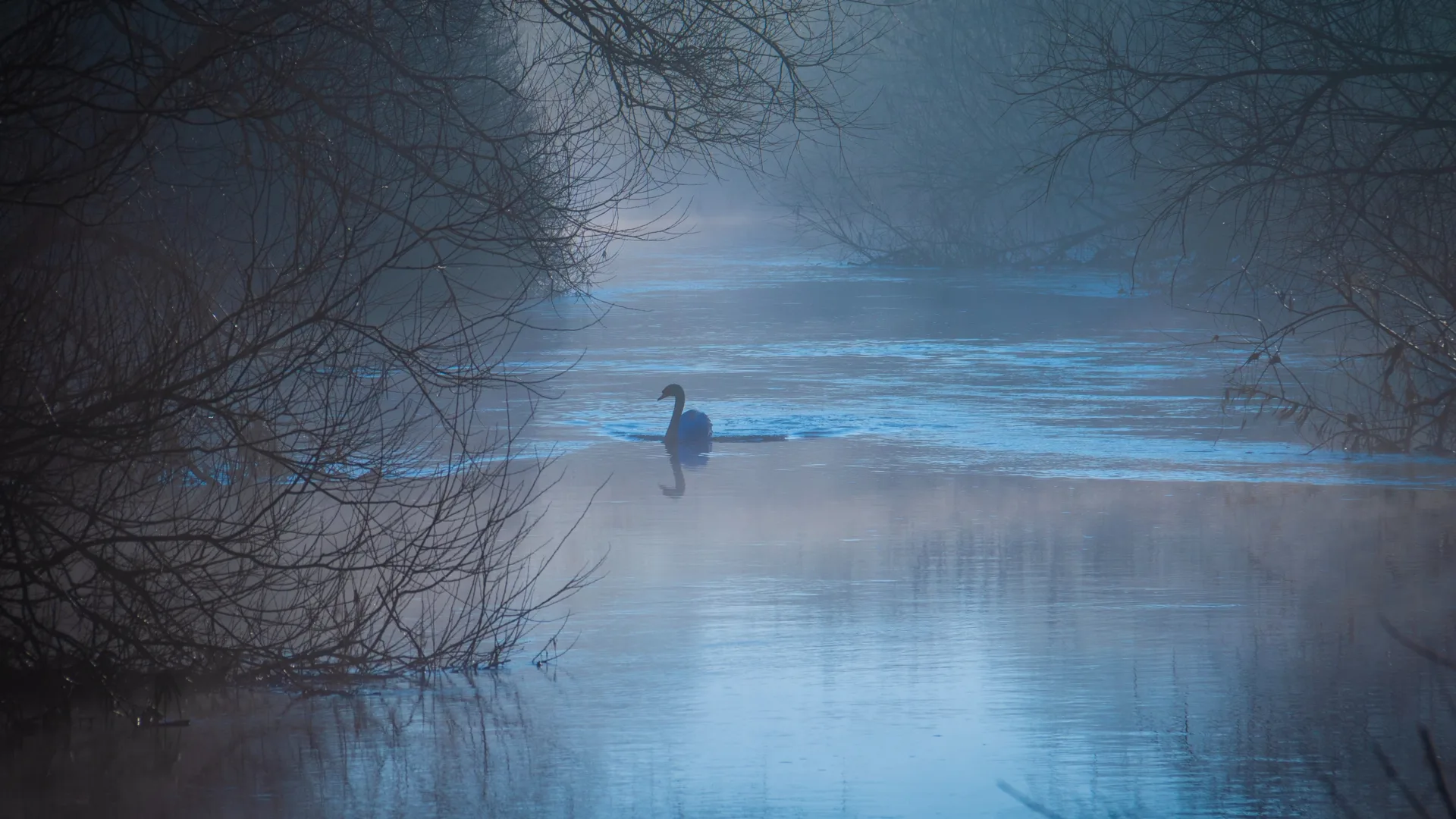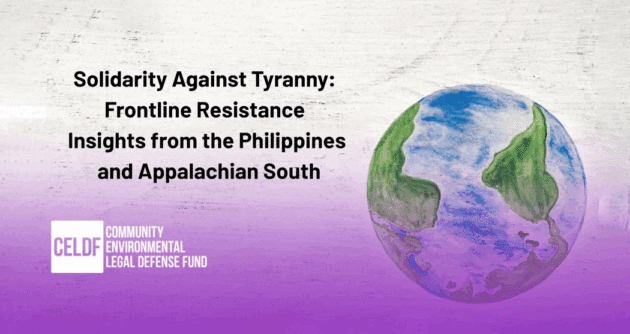A group of authors organized through the Society of Wetland Scientists have developed a proposal for a Universal Declaration of the Rights of Wetlands. CELDF is excited to endorse the efforts as a step toward recognizing and enforcing the rights of wetlands.
“The ongoing destabilization of the global climate and rapid loss of biodiversity impress upon us the urgency for shifting the human–Nature relationship to one of greater reciprocity and respect for Nature,” the authors write.
Lawyers and scientists with the Society of Wetland Scientists’ Rights of Wetlands and Climate Change and Wetlands initiatives organized the proposal and in a paper recognized the failure of existing frameworks of law and policy. The group is planning to share the Declaration with the 171 signatory countries of the Convention on Wetlands (Ramsar Convention), and inviting them to work with others to move toward a framework that ensures the rights of wetlands are understood, respected and upheld, including through contributing knowledge and guidance on designated Ramsar Wetlands of International Importance.
Importantly, the authors see that, “Incorporating a greater emphasis on the rights of wetlands could provide the impetus and means for combining Indigenous and other knowledge.”
“CELDF’s endorsement of the proposed Universal Declaration of the Rights of Wetlands lends important support to the idea that wetlands have inherent rights,” the authors say. “Effectively responding to the challenges of a destabilizing climate, biodiversity loss, and degradation and loss of wetlands calls upon us to reframe our relationship with the world by recognizing the beingness of Nature and the rights that this entails. Creative collaborations between nonprofits, Indigenous peoples and local communities, scientists, attorneys and governance organizations can support this paradigm shift.” We agree.
Authors are Gillian Davies, Max Finlayson, Dave Pritchard, Nick Davidson, Royal Gardner, Bill Moomaw, Erin Okuno and James Whitacre. Collectively, they are affiliated with the Institute for Land, Water, and Society (Charles Sturt University,) Institute for Biodiversity Law and Policy, College of Law (Stetson University), Woodwell Climate Research Center, the Global Development and Environment Institute (Tufts University), the Center for International Environment and Resource Policy, the Fletcher School (Tufts University), and The Center for Governance and Sustainability (University of Massachusetts Boston). One author is a former Deputy Secretary General of Ramsar, two others are former chairs of the Ramsar Scientific & Technical Review Panel, another is the current chair of the Ramsar Culture Network.
The proposed Universal Declaration of the Rights of Wetlands reads as follows:
- Acknowledging that wetlands are essential to the healthy functioning of Earth processes and provision of essential ecosystem services, including climate regulation at all scales, water supply and water purification, flood storage, drought mitigation and storm damage prevention;
- Acknowledging that wetlands have significance for the spiritual or sacred inspirations and belief systems of many people worldwide, but particularly for Indigenous peoples and local communities living in close relationship to wetlands, and that wetlands provide opportunities to learn from and about Nature, which supports scientific understanding and innovation, cultural expression and artistic creativity;
- Further acknowledging that humans and the natural world with all of its biodiversity depend upon the healthy functioning of wetlands and the benefits that they provide, and that wetlands play a significant role in global climate regulation;
- Alarmed that existing wetland conservation and management approaches have failed to stem the loss and degradation of wetlands of all types around the globe;
- Further alarmed that global climate destabilization and biodiversity losses are accelerating and that efforts to reverse these trends are failing;
- Acknowledging that peoples around the world of many cultures and faiths have recognized for millennia that Nature, or elements of Nature, are sentient living beings with inherent value and rights independent of their value to humans, and that Indigenous peoples, local communities and non-governmental organizations have been contributing to a global movement to recognize the rights of Nature;
- Aware that continued degradation and loss of wetlands threaten the very fabric of the planetary Web of Life upon which depend the livelihoods, well-being, community life and spirituality of many people, particularly Indigenous peoples and local communities who live in close relationship with wetlands;
- Guided by recent legal recognition of the inherent rights of Nature, including recognition of the entire Colombian Amazon as an ‘entity subject to rights’ by the Colombian Supreme Court; recognition of the rights and legal and living personhood of the Whanganui River through the Te Awa Tupua Act (Whanganui River Claims Settlement Act) agreed upon by the Māori iwi and the New Zealand Parliament; and Ecuador’s first-in-the-world recognition of the rights of Nature in their Constitution;
- Convinced that recognizing the enduring rights and the legal and living personhood of all wetlands around the world will enable a paradigm shift in the human–Nature relationship towards greater understanding, reciprocity and respect leading to a more sustainable, harmonious and healthy global environment that supports the well-being of both human and non-human Nature;
- Further convinced that recognizing the rights and legal and living personhood of all wetlands and the paradigm shift that this represents will lead to increased capacity to manage wetlands in a manner that contributes to reversing the destabilization of the global climate and biodiversity loss;
- Declares that all wetlands are entities entitled to inherent and enduring rights, which derive from their existence as members of the Earth community and should possess legal standing in courts of law. These inherent rights include the following:
- The right to exist
- The right to their ecologically determined location in the landscape
- The right to natural, connected and sustainable hydrological regimes
- The right to ecologically sustainable climatic conditions
- The right to have naturally occurring biodiversity, free of introduced or invasive species that disrupt their ecological integrity
- The right to integrity of structure, function, evolutionary processes and the ability to fulfil natural ecological roles in the Earth’s processes
- The right to be free from pollution and degradation
- The right to regeneration and restoration
About CELDF — Community Environmental Legal Defense Fund
The Community Environmental Legal Defense Fund (CELDF) is building a movement for Community Rights and the Rights of Nature to advance democratic, economic, social, and environmental rights – building upward from the grassroots to the state, federal, and international level.
A group of authors organized through the Society of Wetland Scientists have developed a proposal for a Universal Declaration of the Rights of Wetlands. CELDF is excited to endorse the efforts as a step toward recognizing and enforcing the rights of wetlands.
“The ongoing destabilization of the global climate and rapid loss of biodiversity impress upon us the urgency for shifting the human–Nature relationship to one of greater reciprocity and respect for Nature,” the authors write.
Lawyers and scientists with the Society of Wetland Scientists’ Rights of Wetlands and Climate Change and Wetlands initiatives organized the proposal and in a paper recognized the failure of existing frameworks of law and policy. The group is planning to share the Declaration with the 171 signatory countries of the Convention on Wetlands (Ramsar Convention), and inviting them to work with others to move toward a framework that ensures the rights of wetlands are understood, respected and upheld, including through contributing knowledge and guidance on designated Ramsar Wetlands of International Importance.
Importantly, the authors see that, “Incorporating a greater emphasis on the rights of wetlands could provide the impetus and means for combining Indigenous and other knowledge.”
“CELDF’s endorsement of the proposed Universal Declaration of the Rights of Wetlands lends important support to the idea that wetlands have inherent rights,” the authors say. “Effectively responding to the challenges of a destabilizing climate, biodiversity loss, and degradation and loss of wetlands calls upon us to reframe our relationship with the world by recognizing the beingness of Nature and the rights that this entails. Creative collaborations between nonprofits, Indigenous peoples and local communities, scientists, attorneys and governance organizations can support this paradigm shift.” We agree.
Authors are Gillian Davies, Max Finlayson, Dave Pritchard, Nick Davidson, Royal Gardner, Bill Moomaw, Erin Okuno and James Whitacre. Collectively, they are affiliated with the Institute for Land, Water, and Society (Charles Sturt University,) Institute for Biodiversity Law and Policy, College of Law (Stetson University), Woodwell Climate Research Center, the Global Development and Environment Institute (Tufts University), the Center for International Environment and Resource Policy, the Fletcher School (Tufts University), and The Center for Governance and Sustainability (University of Massachusetts Boston). One author is a former Deputy Secretary General of Ramsar, two others are former chairs of the Ramsar Scientific & Technical Review Panel, another is the current chair of the Ramsar Culture Network.
The proposed Universal Declaration of the Rights of Wetlands reads as follows:
- Acknowledging that wetlands are essential to the healthy functioning of Earth processes and provision of essential ecosystem services, including climate regulation at all scales, water supply and water purification, flood storage, drought mitigation and storm damage prevention;
- Acknowledging that wetlands have significance for the spiritual or sacred inspirations and belief systems of many people worldwide, but particularly for Indigenous peoples and local communities living in close relationship to wetlands, and that wetlands provide opportunities to learn from and about Nature, which supports scientific understanding and innovation, cultural expression and artistic creativity;
- Further acknowledging that humans and the natural world with all of its biodiversity depend upon the healthy functioning of wetlands and the benefits that they provide, and that wetlands play a significant role in global climate regulation;
- Alarmed that existing wetland conservation and management approaches have failed to stem the loss and degradation of wetlands of all types around the globe;
- Further alarmed that global climate destabilization and biodiversity losses are accelerating and that efforts to reverse these trends are failing;
- Acknowledging that peoples around the world of many cultures and faiths have recognized for millennia that Nature, or elements of Nature, are sentient living beings with inherent value and rights independent of their value to humans, and that Indigenous peoples, local communities and non-governmental organizations have been contributing to a global movement to recognize the rights of Nature;
- Aware that continued degradation and loss of wetlands threaten the very fabric of the planetary Web of Life upon which depend the livelihoods, well-being, community life and spirituality of many people, particularly Indigenous peoples and local communities who live in close relationship with wetlands;
- Guided by recent legal recognition of the inherent rights of Nature, including recognition of the entire Colombian Amazon as an ‘entity subject to rights’ by the Colombian Supreme Court; recognition of the rights and legal and living personhood of the Whanganui River through the Te Awa Tupua Act (Whanganui River Claims Settlement Act) agreed upon by the Māori iwi and the New Zealand Parliament; and Ecuador’s first-in-the-world recognition of the rights of Nature in their Constitution;
- Convinced that recognizing the enduring rights and the legal and living personhood of all wetlands around the world will enable a paradigm shift in the human–Nature relationship towards greater understanding, reciprocity and respect leading to a more sustainable, harmonious and healthy global environment that supports the well-being of both human and non-human Nature;
- Further convinced that recognizing the rights and legal and living personhood of all wetlands and the paradigm shift that this represents will lead to increased capacity to manage wetlands in a manner that contributes to reversing the destabilization of the global climate and biodiversity loss;
- Declares that all wetlands are entities entitled to inherent and enduring rights, which derive from their existence as members of the Earth community and should possess legal standing in courts of law. These inherent rights include the following:
- The right to exist
- The right to their ecologically determined location in the landscape
- The right to natural, connected and sustainable hydrological regimes
- The right to ecologically sustainable climatic conditions
- The right to have naturally occurring biodiversity, free of introduced or invasive species that disrupt their ecological integrity
- The right to integrity of structure, function, evolutionary processes and the ability to fulfil natural ecological roles in the Earth’s processes
- The right to be free from pollution and degradation
- The right to regeneration and restoration
About CELDF — Community Environmental Legal Defense Fund
The Community Environmental Legal Defense Fund (CELDF) is building a movement for Community Rights and the Rights of Nature to advance democratic, economic, social, and environmental rights – building upward from the grassroots to the state, federal, and international level.
A group of authors organized through the Society of Wetland Scientists have developed a proposal for a Universal Declaration of the Rights of Wetlands. CELDF is excited to endorse the efforts as a step toward recognizing and enforcing the rights of wetlands.
“The ongoing destabilization of the global climate and rapid loss of biodiversity impress upon us the urgency for shifting the human–Nature relationship to one of greater reciprocity and respect for Nature,” the authors write.
Lawyers and scientists with the Society of Wetland Scientists’ Rights of Wetlands and Climate Change and Wetlands initiatives organized the proposal and in a paper recognized the failure of existing frameworks of law and policy. The group is planning to share the Declaration with the 171 signatory countries of the Convention on Wetlands (Ramsar Convention), and inviting them to work with others to move toward a framework that ensures the rights of wetlands are understood, respected and upheld, including through contributing knowledge and guidance on designated Ramsar Wetlands of International Importance.
Importantly, the authors see that, “Incorporating a greater emphasis on the rights of wetlands could provide the impetus and means for combining Indigenous and other knowledge.”
“CELDF’s endorsement of the proposed Universal Declaration of the Rights of Wetlands lends important support to the idea that wetlands have inherent rights,” the authors say. “Effectively responding to the challenges of a destabilizing climate, biodiversity loss, and degradation and loss of wetlands calls upon us to reframe our relationship with the world by recognizing the beingness of Nature and the rights that this entails. Creative collaborations between nonprofits, Indigenous peoples and local communities, scientists, attorneys and governance organizations can support this paradigm shift.” We agree.
Authors are Gillian Davies, Max Finlayson, Dave Pritchard, Nick Davidson, Royal Gardner, Bill Moomaw, Erin Okuno and James Whitacre. Collectively, they are affiliated with the Institute for Land, Water, and Society (Charles Sturt University,) Institute for Biodiversity Law and Policy, College of Law (Stetson University), Woodwell Climate Research Center, the Global Development and Environment Institute (Tufts University), the Center for International Environment and Resource Policy, the Fletcher School (Tufts University), and The Center for Governance and Sustainability (University of Massachusetts Boston). One author is a former Deputy Secretary General of Ramsar, two others are former chairs of the Ramsar Scientific & Technical Review Panel, another is the current chair of the Ramsar Culture Network.
The proposed Universal Declaration of the Rights of Wetlands reads as follows:
- Acknowledging that wetlands are essential to the healthy functioning of Earth processes and provision of essential ecosystem services, including climate regulation at all scales, water supply and water purification, flood storage, drought mitigation and storm damage prevention;
- Acknowledging that wetlands have significance for the spiritual or sacred inspirations and belief systems of many people worldwide, but particularly for Indigenous peoples and local communities living in close relationship to wetlands, and that wetlands provide opportunities to learn from and about Nature, which supports scientific understanding and innovation, cultural expression and artistic creativity;
- Further acknowledging that humans and the natural world with all of its biodiversity depend upon the healthy functioning of wetlands and the benefits that they provide, and that wetlands play a significant role in global climate regulation;
- Alarmed that existing wetland conservation and management approaches have failed to stem the loss and degradation of wetlands of all types around the globe;
- Further alarmed that global climate destabilization and biodiversity losses are accelerating and that efforts to reverse these trends are failing;
- Acknowledging that peoples around the world of many cultures and faiths have recognized for millennia that Nature, or elements of Nature, are sentient living beings with inherent value and rights independent of their value to humans, and that Indigenous peoples, local communities and non-governmental organizations have been contributing to a global movement to recognize the rights of Nature;
- Aware that continued degradation and loss of wetlands threaten the very fabric of the planetary Web of Life upon which depend the livelihoods, well-being, community life and spirituality of many people, particularly Indigenous peoples and local communities who live in close relationship with wetlands;
- Guided by recent legal recognition of the inherent rights of Nature, including recognition of the entire Colombian Amazon as an ‘entity subject to rights’ by the Colombian Supreme Court; recognition of the rights and legal and living personhood of the Whanganui River through the Te Awa Tupua Act (Whanganui River Claims Settlement Act) agreed upon by the Māori iwi and the New Zealand Parliament; and Ecuador’s first-in-the-world recognition of the rights of Nature in their Constitution;
- Convinced that recognizing the enduring rights and the legal and living personhood of all wetlands around the world will enable a paradigm shift in the human–Nature relationship towards greater understanding, reciprocity and respect leading to a more sustainable, harmonious and healthy global environment that supports the well-being of both human and non-human Nature;
- Further convinced that recognizing the rights and legal and living personhood of all wetlands and the paradigm shift that this represents will lead to increased capacity to manage wetlands in a manner that contributes to reversing the destabilization of the global climate and biodiversity loss;
- Declares that all wetlands are entities entitled to inherent and enduring rights, which derive from their existence as members of the Earth community and should possess legal standing in courts of law. These inherent rights include the following:
- The right to exist
- The right to their ecologically determined location in the landscape
- The right to natural, connected and sustainable hydrological regimes
- The right to ecologically sustainable climatic conditions
- The right to have naturally occurring biodiversity, free of introduced or invasive species that disrupt their ecological integrity
- The right to integrity of structure, function, evolutionary processes and the ability to fulfil natural ecological roles in the Earth’s processes
- The right to be free from pollution and degradation
- The right to regeneration and restoration
About CELDF — Community Environmental Legal Defense Fund
The Community Environmental Legal Defense Fund (CELDF) is building a movement for Community Rights and the Rights of Nature to advance democratic, economic, social, and environmental rights – building upward from the grassroots to the state, federal, and international level.



